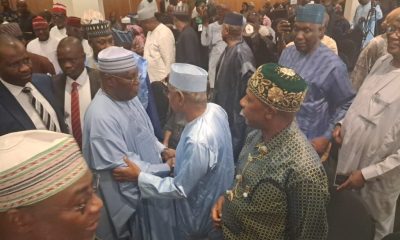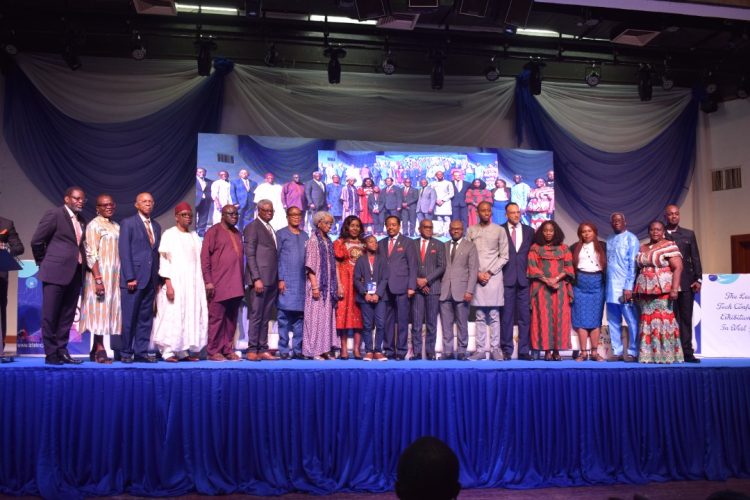Chairman of the Heirs Holdings,Tony Elumelu, and other Information and Communication Technology (ICT) stakeholders at the Lagos Chamber of Commerce and Industry (LCCI) Information Communication Technology and Telecommunication (ICTEL) Expo in Lagos on Wednesday advocated for scaling up Nigeria’s digital infrastructure.
Elumelu, represented by Peter Ashade, Group Chief Executive Officer, United Capital Plc. at the expo, with the theme: “Ensuring Efficient Digital Infrastructure in Nigeria”, noted that the country’s Fintech indicated the need to rapidly scale up the digital infrastructure, seeing that in 2021, Nigeria’s Fintech startups raised about 730 million dollars in investments.
He pointed out that, though, Nigeria’s internet base was barely half of its population at the start of 2022 with 51 per cent internet penetration, 44 per cent broadband penetration and 54 per cent 3G coverage.
He said the deployment of the 5G network spectrum in rural areas was currently low and presented huge opportunities for the private sector to drive economic growth in the informal sector, which dominated rural activities.
Elumelu emphasized that private participation was needed to spur the adoption and use of broadband.
According to him, “There must be preferential taxation for providers who agree on specific universal access targets.
“There’s also the need to review spectrum policies, provide more license spectrums and focus more on transparency initiatives to reduce uncertainty around long-term investments for private investors.
“Heirs holdings is uniquely positioned to work with ICT industry stakeholders on specialised financing for ICT infrastructure projects, amongst others, seeing that digital infrastructure is the growth catalyst for modern economies.”
The Managing Director of Galaxy Backbone Ltd., (GBB), Prof. Mohammad Abubakar, also said that public-private partnership (PPP) is essential to providing efficient digital infrastructure in accelerating digital transformation, through collaborations and effective communication across borders.
Abubakar, represented by Dauda Oyeleye, Group Head, Business Development, GBB, disclosed that to further solidify GBB, the company created an Enterprise Business Group (EBG) tasked with the sole responsibility of managing private customers as well as structured partnerships.
He stated that GBB had a pervasive fibre connectivity network across the nation, which the private sector could key into.
“We have established partnerships with managed service providers, real estate developers, as well as other local organisations to reach the goal of attaining a digital Nigeria.
“Our state-of-the-art infrastructure has been instrumental in sealing these deals and the partnerships just keep getting better.
“GBB has taken steps to secure public confidence in the use of its digital infrastructure, through trusted international third-party attestations and would continue to redefine collaboration within and outside the country,” he said.
President, LCCI, Dr. Michael Olawale-Cole, said the theme was in view of the fact that the Federal Government had announced a target of 40 billion dollars private capital investment in digital infrastructure by 2025, beside facilitating about 1 billion dollars in private equity.
He added that the government recently inaugurated the National Council on Infrastructure, with a plan to double Nigeria’s infrastructure stock of the Gross Domestic Product (GDP) from the prevailing 35 per cent to about 70 per cent.
The LCCI president said the 2022 ICTEL EXPO would give deserved focus to digital infrastructure because, over the decades, next to corruption, poor infrastructure was Nigeria’s greatest socio-economic development challenge.
According to him, “The ones commonly focused on are power, roads, water but we dare say, however, that as critical as the listed ones and indeed others not listed are, if Nigeria gets digital infrastructure right, the benefits to the nation’s ICT sector and on the government’s digital economy agenda would be enormous.
“The 2022 ICTEL EXPO will also create a platform for all stakeholders to engage in robust discussions on the government’s plans to grow the digital economy from 10.68 per cent to 12.54 per cent and improve e-governance by 100 per cent by 2025.”

 Latest1 week ago
Latest1 week ago
 Health1 week ago
Health1 week ago
 Football1 week ago
Football1 week ago
 News1 week ago
News1 week ago
 News1 week ago
News1 week ago
 Latest7 days ago
Latest7 days ago
 Latest7 days ago
Latest7 days ago
 Crime1 week ago
Crime1 week ago

